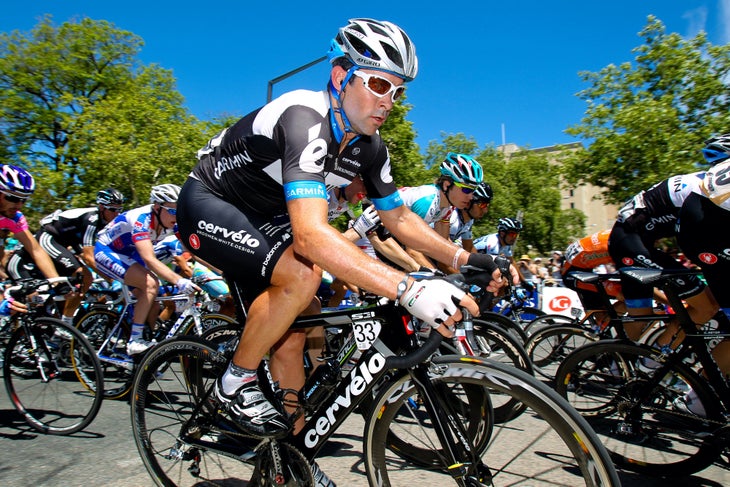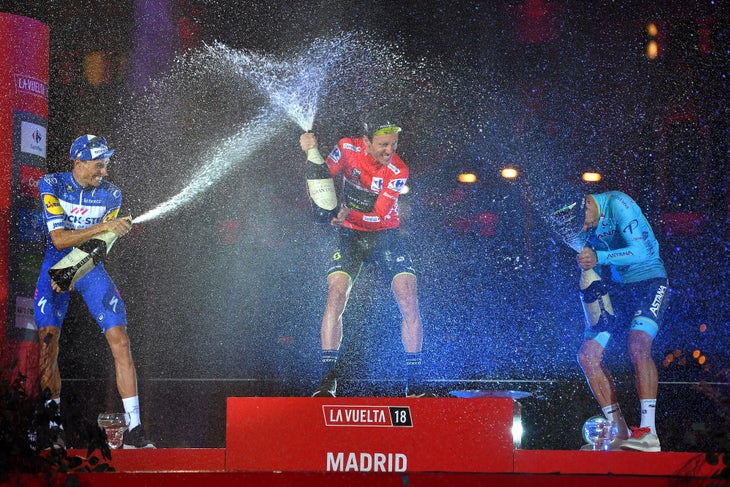Heading out the door? Read this article on the new Outside+ app available now on iOS devices for members! Download the app.
Julian Dean is helping script what a modern sport director looks like in the 21st century in his role with Mitchelton-Scott.
Long gone are the days when a sport director would rule imperialistically over a team and bark orders from afar. Today’s highly-tuned peloton is more specialized and professional than ever. As cycling has modernized, so has the role of the sport director.
New information and technology has made cycling more scientific than ever. The sport still needs knowledge and racing acumen. That’s where a modern sport fits in, marrying the experience and skills with an over-abundance of information and data that’s driving the sport.
Dean, 44, raced 14 seasons at the top of the sport before retiring. He won 11 races in his career as a sprinter, but he earned his check as one of the top lead-out men in the peloton, helping Thor Hushovd and Tyler Farrar at the peak of careers.

Dean initially helped Mitchelton-Scott scout each day’s race route, driving ahead of the race and calling back real-time details on wind direction, course conditions and dangerous choke-points that prove decisive. He gradually grew into the DS position, and had the distinction of directing Simon Yates to victory in the 2018 Vuelta a España in what was his first grand tour behind the lead team car.
VeloNews recently caught up with Dean to chat about how the role of sport director is evolving in the modern peloton.
VeloNews: Julian, you had a long racing career, and transitioned into the sport director role. And in your very first grand tour as the lead sport director, you win with Simon Yates in the 2018 Vuelta. That’s a nice way to start!
Julian Dean: We have a great bunch of riders and staff. Everyone works well together on this team. I just have to make sure I don’t get in their way.
VN: That Vuelta GC win was an important milestone for the team. GreenEdge started out as stage-hunters and now you’re among the best grand tour contenders. What did Yates’ win mean for the team?
JD: It was a big achievement for the team. It was something we’ve been close to before and what we’ve been gunning for. When we started out eight years ago, that was the ultimate goal. We had [team owner] Gerry Ryan at the race for us in Madrid. It was a big moment for him. We learned pretty quickly that you cannot take your foot off the gas. Now every grand tour we go to we are trying to have someone on the podium. The Vuelta gave us confidence, now we are going to try to get it right at the Giro and the Tour.
VN: You were doing other things after finishing your career, and you came onto the staff as a road scout. How did you finally decide to become a sport director?
JD: When I stopped racing I said I never wanted to be a sport director. I was doing more coaching and performance management. Nowadays, with the technology we have, with things like VeloViewer, the data we have on the riders, the recovery protocol, it’s quite a complex system that needs to be managed by a sport director. We have so much information at our fingertips now. What the riders need most is the right information at the right time. That was an interesting challenge. The role of sport director has certainly changed a lot.
VN: How has it changed since you were racing 20 years ago?
JD: The role has changed a lot. Everything is very specialized right now. It’s taken the sport to a new level. Every team has nutritionists, coaches, trainers, so everything has been compartmentalized. It’s the sport director’s job to pull that information together and give that to the riders. We have power-point presentations before each stage. There’s a lot to pull together and the delivery of the information from inside the car. The most important thing is to pass along the information so that it’s meaningful.
VN: The pressure is higher than ever to perform, is that something the sport directors feel as well?
JD: You can’t be an old-school team anymore. The differences are so small. If you don’t have your foot on the accelerator, you’re going to be left behind in this modern peloton.

VN: Mitchelton-Scott is now one of the top grand tour teams. Is it the team’s goal to beat Ineos? Does every team try to emulate them?
JD: Ineos has so much more resources than any other team. The depth of their squad is enormous and that’s a huge advantage. You have to have your own culture and your own way of going about things. Even if we had the budget of Sky/Ineos, we wouldn’t want to copy them. Our goal is to keep our culture, hang on to the way we are doing our business, and that’s a big part of this team. We want to win through the evolution of our own culture.
VN: There are so many young riders performing at a top-level today. There has always been young talent, but do you agree that there’s a boom in younger riders hitting success?
JD: It’s an interesting time. One of the things we’ve seen over the years is that cycling really hangs on to the old ways of doing things. And one of those old beliefs was that young riders can’t win grand tours, or that young riders can’t win classics, because they’re too long or too hard, or that they cannot handle a grand tour at 22. That’s this old mentality that’s lagging over from a few decades ago. It’s a big shift we’re starting to see. If the training’s right, there’s no reason that we will not be seeing more 22-year-old’s winning big races. The risk there is that you put them under pressure and load them up on the training, so what’s going to be outcome when they’re 32, 35? And the demands are even more so today, with so much time at altitude, diet, away from family, that comes at a mental cost.
VN: Everyone talks about how there’s no longer any downtime, not during the races nor during the season. Is it too much?
JD: Those days of being a little loose about your training or letting your diet get away, all that stuff’s gone. If you want to be at WorldTour level, you cannot miss a beat. You have to be on top of that stuff all the time. It’s mentally fatiguing. It’s not unlikely that we will see more situations like Marcel Kittel [who retired aged 31 citing a loss of quality of life while racing] in the future.
Mitchelton-Scott head into 2020 with its trio of leaders Estaban Chaves and the Yates brothers continuing the team’s grand tour challenge. With Dean there to guide them, their prospects look bright.